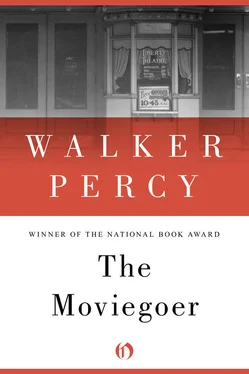Walker Percy - The Moviegoer
Здесь есть возможность читать онлайн «Walker Percy - The Moviegoer» весь текст электронной книги совершенно бесплатно (целиком полную версию без сокращений). В некоторых случаях можно слушать аудио, скачать через торрент в формате fb2 и присутствует краткое содержание. Год выпуска: 2011, Издательство: Open Road Media, Жанр: Современная проза, на английском языке. Описание произведения, (предисловие) а так же отзывы посетителей доступны на портале библиотеки ЛибКат.
- Название:The Moviegoer
- Автор:
- Издательство:Open Road Media
- Жанр:
- Год:2011
- ISBN:нет данных
- Рейтинг книги:5 / 5. Голосов: 1
-
Избранное:Добавить в избранное
- Отзывы:
-
Ваша оценка:
- 100
- 1
- 2
- 3
- 4
- 5
The Moviegoer: краткое содержание, описание и аннотация
Предлагаем к чтению аннотацию, описание, краткое содержание или предисловие (зависит от того, что написал сам автор книги «The Moviegoer»). Если вы не нашли необходимую информацию о книге — напишите в комментариях, мы постараемся отыскать её.
The Moviegoer — читать онлайн бесплатно полную книгу (весь текст) целиком
Ниже представлен текст книги, разбитый по страницам. Система сохранения места последней прочитанной страницы, позволяет с удобством читать онлайн бесплатно книгу «The Moviegoer», без необходимости каждый раз заново искать на чём Вы остановились. Поставьте закладку, и сможете в любой момент перейти на страницу, на которой закончили чтение.
Интервал:
Закладка:
We stand formally in the informal living area.
“Harold, how long have you been here?”
“Three years. Look at this, Rollo.” Harold shoves along the bar-peninsula a modernistic horsehead carved out of white wood, all flowing mane and arching neck. “Who do you think made it?”
“It’s very good.”
“Old Rollo,” says Harold, eying the middle of my chest. Harold can’t parse it out, so he has to do something. “Rollo, how tough are you? I bet I can take you.” Harold wrestled at Northwestern. “I could put you down right now.” Harold is actually getting mad at me.
“Listen, Harold,” I say, laughing. “Do you go into the city every day?”
Harold nods but does not raise his eyes.
“How did you decide to live here?”
“Sylvia’s family live in Glencoe. Rollo, how do you like it way down yonder in New Orleans?”
Harold would really like to wrestle and not so playfully either. I walked in and brought it with me, the wrenching in the chest. It would be better for him to be rid of it and me.
Ten minutes later he lets us out at the commuter station and tears off into the night.
“What a peculiar family,” says Kate, gazing after the red turrets of Harold’s Cadillac.
Back to the Loop where we dive into the mother and Urwomb of all moviehouses — an Aztec mortuary of funeral urns and glyphs, thronged with the spirit-presences of another day, William Powell and George Brent and Patsy Kelly and Charley Chase, the best friends of my childhood — and see a movie called The Young Philadelphians. Kate holds my hand tightly in the dark.
Paul Newman is an idealistic young fellow who is disillusioned and becomes cynical and calculating. But in the end he recovers his ideals.
Outside, a new note has crept into the wind, a black williwaw sound straight from the terrible wastes to the north. “Oh oh oh,” wails Kate as we creep home to the hotel, sunk into ourselves and with no stomach even for hand-holding. “Something is going to happen.”
Something does. A yellow slip handed across the hotel desk commands me to call operator three in New Orleans.
This I accordingly do, and my aunt’s voice speaks to the operator, then to me, and does not change its tone. She does not bother to add a single overtone of warmth or cold, love or hate, to the monotone of her notification — and this is more ominous than ten thousand williwaws.
“Is Kate with you?”
“Yes ma’am.”
“Would you like to know how we found you?”
“Yes.”
“The police found Kate’s car at the terminal.”
“The police?”
“Kate did not tell anyone she was leaving. However, her behavior is not unexplainable and therefore not inexcusable. Yours is.”
I am silent.
“Why didn’t you tell me?”
I think. “I can’t remember.”
IT IS IMPOSSIBLE to find a seat on a flight to New Orleans the night before Mardi Gras. No trains are scheduled until Tuesday morning. But buses leave every hour or so. I send my aunt a telegram and call Stanley Kinchen and excuse myself from the talk on Selling Aids — it is all right: the original speaker had recovered. Stanley and I part even more cordially than we met. It is a stratospheric cordiality such as can only make further meetings uneasy. But I do not mind. At midnight we are bound for New Orleans on a Scenicruiser which takes a more easterly course than the Illinois Central, down along the Wabash to Memphis by way of Evansville and Cairo.
It is good to be leaving; Chicago is fit for no more than a short rotation. Kate is well. The summons from her stepmother has left her neither glum nor fearful. She speaks at length to her stepmother and, with her sure instinct for such matters, gets her talking about canceling reservations and return tickets, wins her way, decides we’ll stay, then changes her mind and insists on coming home to ease their minds. Now she gazes curiously about the bus station, giving way every few seconds to tremendous face-splitting yawns. Once on the bus she collapses into a slack-jawed oblivion and sleeps all the way to the Ohio River. I doze fitfully and wake for good when the dawn breaks on the outskirts of Terre Haute. When it is light enough, I take out my paper-back Arabia Deserta and read until we stop for breakfast in Evansville. Kate eats heartily, creeps back to the bus, takes one look at the black water of the Ohio River and the naked woods of the bottom lands where winter still clings like a violet mist, and falls heavily to sleep, mouth mashed open against my shoulder.
Today is Mardi Gras, fat Tuesday, but our bus has left Chicago much too late to accommodate Carnival visitors. The passengers are an everyday assortment of mothers-in-law visiting sons-in-law in Memphis, school teachers and telephone operators bound for vacations in quaint old Vieux Carré. Our upper deck is a green bubble where, it turns out, people feel themselves dispensed from the conventional silence below as if, in mounting with others to see the wide world and the green sky, they had already established a kind of freemasonry and spoken the first word among themselves. I surrender my seat to Kate’s stretchings out against me and double up her legs for her and for the rest of the long day’s journey down through Indiana and Illinois and Kentucky and Tennessee and Mississippi hold converse with two passengers — the first, a romantic from Wisconsin; the second, a salesman from a small manufacturing firm in Murfreesboro, Tennessee, who wrecked his car in Gary.
Now in the fore seat of the bubble and down we go plunging along the Illinois bank of the Mississippi through a region of sooty glens falling steeply away to the west and against the slope of which are propped tall frame houses with colored windows and the spires of Polish churches. I read:
We mounted in the morrow twilight; but long after daybreak the heavens seemed shut over us, as a tomb, with gloomy clouds. We were engaged in horrid lava beds.
The romantic sits across the aisle, slumped gracefully, one foot propped on the metal ledge. He is reading The Charterhouse of Parma. His face is extraordinarily well-modeled and handsome but his head is too small and, arising as it does from the great collar of his car coat, it makes him look a bit dandy and dudish. Two things I am curious about. How does he sit? Immediately graceful and not aware of it or mediately graceful and aware of it? How does he read The Charterhouse of Parma? Immediately as a man who is in the world and who has an appetite for the book as he might have an appetite for peaches, or mediately as one who finds himself under the necessity of sticking himself into the world in a certain fashion, of slumping in an acceptable slump, of reading an acceptable book on an acceptable bus? Is he a romantic?
He is a romantic. His posture is the first clue: it is too good to be true, this distillation of all graceful slumps. To clinch matters, he catches sight of me and my book and goes into a spasm of recognition and shyness. To put him out of his misery, I go over and ask him how he likes his book. For a tenth of a second he eyes me to make sure I am not a homosexual; but he has already seen Kate with me and sees her now, lying asleep and marvelously high in the hip. (I have observed that it is no longer possible for one young man to speak unwarily to another not known to him, except in certain sections of the South and West, and certainly not with a book in his hand.) As for me, I have already identified him through his shyness. It is pure heterosexual shyness. He is no homosexual, but merely a romantic. Now he closes his book and stares hard at it as if he would, by dint of staring alone, tear from it its soul in a word. “It’s — very good,” he says at last and blushes. The poor fellow. He has just begun to suffer from it, this miserable trick the romantic plays upon himself: of setting just beyond his reach the very thing he prizes. For he prizes just such a meeting, the chance meeting with a chance friend on a chance bus, a friend he can talk to, unburden himself of some of his terrible longings. Now having encountered such a one, me, the rare bus friend, of course he strikes himself dumb. It is a case for direct questioning.
Читать дальшеИнтервал:
Закладка:
Похожие книги на «The Moviegoer»
Представляем Вашему вниманию похожие книги на «The Moviegoer» списком для выбора. Мы отобрали схожую по названию и смыслу литературу в надежде предоставить читателям больше вариантов отыскать новые, интересные, ещё непрочитанные произведения.
Обсуждение, отзывы о книге «The Moviegoer» и просто собственные мнения читателей. Оставьте ваши комментарии, напишите, что Вы думаете о произведении, его смысле или главных героях. Укажите что конкретно понравилось, а что нет, и почему Вы так считаете.












